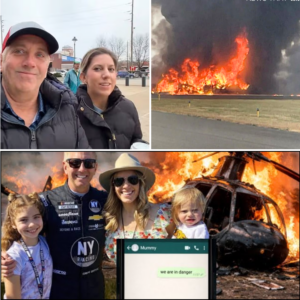In the heart of Silicon Valley, the Crescent Park neighborhood of Palo Alto, California, has long been a symbol of suburban tranquility. Nestled under towering oak, redwood, and magnolia trees, this affluent enclave was once a tight-knit community where doctors, lawyers, Stanford professors, and tech executives lived in charming Craftsman homes and bungalows. Children played in gardens, neighbors bonded at annual block parties, and the streets echoed with laughter. But over the past 14 years, this idyllic picture has been disrupted by one of the world’s most powerful tech moguls: Mark Zuckerberg, the co-founder and CEO of Meta. Since 2011, Zuckerberg has quietly amassed a staggering 11 properties in Crescent Park, spending over $110 million to create a sprawling personal compound. His actions have sparked outrage among residents, who claim their once-peaceful neighborhood has been transformed into a fortress of surveillance, construction, and exclusivity.
A Billionaire’s Monopoly on Crescent Park
Zuckerberg’s real estate journey in Palo Alto began in 2011 when he purchased a 5,600-square-foot home on Edgewood Drive for $7 million. The five-bedroom, five-and-a-half-bath residence, located just 10 minutes from Meta’s Menlo Park headquarters, came equipped with a saltwater pool, a glass-enclosed sunroom, and a sprawling backyard pavilion. It was a fitting home for Zuckerberg, then a rising tech star, and his wife, Priscilla Chan, whom he married in 2012. However, this initial purchase was only the beginning. Over the next decade, Zuckerberg embarked on an aggressive campaign to acquire neighboring properties, turning Crescent Park into what some residents describe as his personal “Monopoly board.”
By 2025, Zuckerberg had spent more than $110 million to acquire at least 11 homes along Edgewood Drive and Hamilton Avenue. Some of these properties were purchased for as much as $14.5 million—double or even triple their market value—to secure privacy for Zuckerberg, Chan, and their three daughters, Maxima, August, and Aurelia. Five of these homes have been merged into a single compound, serving as the family’s primary residence. The estate is a testament to luxury, featuring guest houses, manicured gardens, a pickleball court, and a pool with a hydrofloor that can transform into a dance floor. A striking seven-foot silver statue of Chan, commissioned by Zuckerberg, stands as a centerpiece, while beneath the compound lies a 7,000-square-foot subterranean space that neighbors have dubbed a “billionaire’s bat cave.”
A Private School and Zoning Controversies
Among the most contentious aspects of Zuckerberg’s compound is the use of one property as a private school for 14 children, including his daughters. Staffed by six adults, including four teachers, the school operates in a residential area where such use violates Palo Alto’s zoning codes. The setup, described by some as a homeschooling pod formed during the COVID-19 pandemic, has drawn criticism from residents who argue it exemplifies Zuckerberg’s disregard for local regulations. The city’s apparent leniency—approving 56 permits for Zuckerberg’s properties since 2011—has fueled accusations that officials are bending to the billionaire’s influence.
In 2016, Zuckerberg proposed demolishing four homes to build smaller residences with large basements, aiming to expand his compound. The Palo Alto Architectural Review Board rejected the plan, citing concerns about neighborhood character and the region’s acute housing shortage. Undeterred, Zuckerberg proceeded gradually, acquiring and renovating properties one by one to avoid further scrutiny. Critics, including City Council member Greer Stone, have accused him of exploiting zoning loopholes, turning Crescent Park into a “gated, gilded city on a hill” where community ties have eroded.
Neighborhood Disruption and Surveillance Concerns
For many Crescent Park residents, Zuckerberg’s expansion has come at a steep cost. The construction of his compound, spanning over eight years, has filled the neighborhood with noise, heavy machinery, and debris. Blocked driveways, damaged parked cars, and constant disruption have become the norm. One resident, Michael Kieschnick, whose Hamilton Avenue home is surrounded on three sides by Zuckerberg-owned properties, described the situation as an “occupation.” He recounted an incident where police posted tow-away signs on a public street for five hours to accommodate a backyard barbecue hosted by Zuckerberg, highlighting the billionaire’s ability to influence local authorities.
Surveillance is another major grievance. Neighbors report security cameras positioned on Zuckerberg’s properties that appear to overlook adjacent homes, raising privacy concerns. Private security guards, stationed in vehicles, have been known to film pedestrians and question passersby on public sidewalks. While a spokesperson for Zuckerberg and Chan insists that cameras are not aimed at neighboring properties and that adjustments are made upon request, residents remain skeptical. The heavy security presence, coupled with high hedges and privacy barriers, has created an atmosphere of isolation, replacing the neighborhood’s once-open, communal spirit.
Attempts at Goodwill and Neighborly Tensions
In response to complaints, Zuckerberg’s team has made efforts to appease neighbors. Security guards now use quieter electric vehicles, and staff are encouraged to carpool or use ride-shares to reduce parking issues. During particularly disruptive periods, Zuckerberg’s team has sent gift baskets containing sparkling wine, chocolates, Krispy Kreme doughnuts, and even noise-canceling headphones—an attempt to mitigate the impact of relentless construction noise. Last year, an ice cream truck was sent to the neighborhood’s annual block party, though Zuckerberg himself has never attended.
These gestures, however, have done little to quell resentment. Some residents view the gifts as patronizing, with one anonymous neighbor remarking on social media, “Sorry for being an insufferable nuisance, here are some headphones.” Others, like Kieschnick, have rejected offers from Zuckerberg’s team to buy their homes, determined to preserve their roots in Crescent Park despite the billionaire’s growing footprint. “Billionaires everywhere make their own rules,” Kieschnick said. “Zuckerberg and Chan are not unique, except that they’re our neighbors.”
A Pattern of Property Acquisition
Zuckerberg’s real estate ventures extend far beyond Palo Alto. His portfolio, valued at over $300 million, includes a 2,300-acre compound in Kauai, Hawaii, featuring two mansions, a 5,000-square-foot underground shelter, and amenities like treehouses and a tennis court. In Lake Tahoe, he owns multiple properties, and in March 2025, he purchased a $23 million mansion in Washington, D.C., strategically located near embassies and the U.S. Naval Observatory. These acquisitions, often shrouded in secrecy through limited-liability companies, reflect Zuckerberg’s penchant for creating ultra-private enclaves.
In Hawaii, his Kauai compound has sparked similar controversies, with locals criticizing the scale of construction and its impact on sacred burial sites. In Palo Alto, the pattern is clear: Zuckerberg buys surrounding properties to ensure privacy and control, often at the expense of community cohesion. His 2013 purchase of four homes around his Edgewood Drive residence, costing over $30 million, was motivated by a developer’s plan to market a neighboring property as “next to Zuckerberg.” By leasing these homes back to their residents, he maintained control without displacing families outright, but the move set the tone for his later acquisitions.
A Community Transformed
For Crescent Park’s longtime residents, the transformation of their neighborhood is a bitter pill. The sense of community that once defined the area—block parties, children playing freely, neighbors borrowing cups of sugar—has been replaced by construction noise, surveillance, and a palpable divide between Zuckerberg’s empire and the remaining residents. While his spokesperson emphasizes the family’s commitment to the community and efforts to minimize disruption, many feel that Crescent Park has lost its soul.
The broader implications of Zuckerberg’s actions raise questions about wealth, power, and privilege in Silicon Valley. As one of the world’s richest individuals, with a net worth exceeding $260 billion, Zuckerberg has the resources to reshape entire neighborhoods to suit his needs. Yet, his neighbors argue that this comes at the cost of their community’s identity and livability. “No neighborhood wants to be occupied,” Kieschnick said, encapsulating the sentiment of many. As Zuckerberg continues to expand his real estate empire, from Palo Alto to Hawaii and beyond, the tension between billionaire ambition and community values remains a stark reminder of the growing divide between the ultra-wealthy and everyone else.



